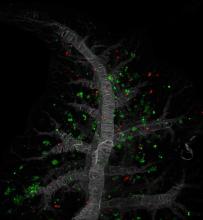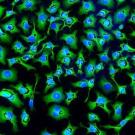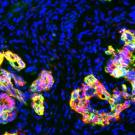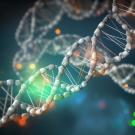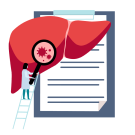News
Academic Spotlight: Juan Qin, PhD
Juan Qin, PhD, (pronounced “JOO-anh CHEEN”) grew up in Anhui Province, China in a small mountain village that was so remote that neighboring villages each spoke their own dialect. “We had very limited access to information, and people around me got cancer without receiving access to any treatment,”
New Pediatric Cancer Marker, New Hope for a Treatment Target
Researchers recently identified a universal, essential biomarker for the childhood cancer neuroblastoma – and the biomarker could be a potential new target for treatment. Neuroblastoma accounts for 15% of all pediatric cancer deaths and is the most common source of childhood tumors outside of brain
Can a New Drug Candidate Cure Pancreatic Cancer?
UC San Francisco researchers have designed a candidate drug that could help make pancreatic cancer, which is almost always fatal, a treatable, perhaps even curable, condition. The new drug candidate permanently modifies a wily cancer-causing mutation, called K-Ras G12D, that is responsible for
Targeted Treatment of Rare Childhood Leukemia
Juvenile myelomonocytic leukemia (JMML) is a rare but aggressive childhood leukemia. While hematopoietic stem cell transplantation is curative for some patients, approximately half of all patients see their leukemia return following a transplant. Recent studies have identified that the number of
Can AI Help Doctors Find Cancer Faster by Reviewing Records?
A form of artificial intelligence called large language modeling (LLM), the same technology behind ChatGPT, could someday improve liver cancer care by extracting important data from medical charts much faster than humans, a recent UCSF study found. LLMs use deep learning and large data sets to
New Walnut Creek Cancer Center Brings Specialty Care Close to Home
The UCSF Health-John Muir Health Jean and Ken Hofmann Cancer Center at the Behring Pavilion opened today, bringing a full spectrum of leading-edge cancer care close to home for people in the East Bay and surrounding areas. The state-of-the art center is an important step in UCSF Health’s vision of
UCSF Tops Public Universities in NIH Research Funding in 2023
It is the 17th year in a row that UCSF has earned this distinction among public institutions. Postdoctoral scholar Oscar Campos, PhD, works in the Lim Lab at UCSF. Photo by Noah Berger “Support from the NIH enables our researchers to test their boldest ideas for advancing science, medicine and


